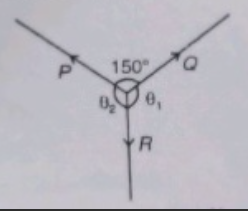Can two unequal forces acting at a point be in equilibrium? Can three?
Text Solution
No. But three forces can produce equilibrium if any one of the forces is equal to the resultant of the third.
|
Topper's Solved these Questions
- DYNAMICSBook:ICSEChapter:DYNAMICSExercise:SHORT ANSWER QUESTIONS WITH ANSWERES
Explore 43 Videos
- DIMENSIONSBook:ICSEChapter:DIMENSIONSExercise:SELECTED PROBLEMS (FROM CONVERSIONS OF ONE SYSTEMS OF UNITS INTO ANOTHER)
Explore 9 Videos
- FRICTIONBook:ICSEChapter:FRICTIONExercise:Selected problems
Explore 30 Videos
Similar Questions
Knowledge Check
Two forces of magnitudes 30, 60 and P newton acting at a point are in equilibrium. If the angle between the first two is 60∘, the value of P is :
Amv√2B2 mvC√2mvD√2mvThree forces of magnitude 30, 60 and P acting at a point are in equilibrium. If the angle between the first two is 60∘, the value of P is
A30√7B30√3C20√6D25√2Three forces of magnitude 30, 60 and P acting at a point are in equilibrium. If the angle between the first two is 60∘, the value of P is
A30√7B30√3C20√6D25√2
The minimum number of unequal forces in a plane that can keep a particle in equilibrium is
View Solution(A) : A body subjected to three concurrent forces cannot be in equilibrium.
(R) : If large number of concurrent forces acting on the same point, then the point may be in equilibrium, even if the vectorial sum of all the force is not zero.
View SolutionThree forces are acting on a body to make it in equilibrium , which set can not do it ?
View SolutionThree forces 9,12 and 15N acting at a point are in equilibrium . The angle between 9N and 15N is
View SolutionThe minimum number of unequal forces in a plane that can keep a particle in equilibrium is
View Solution

